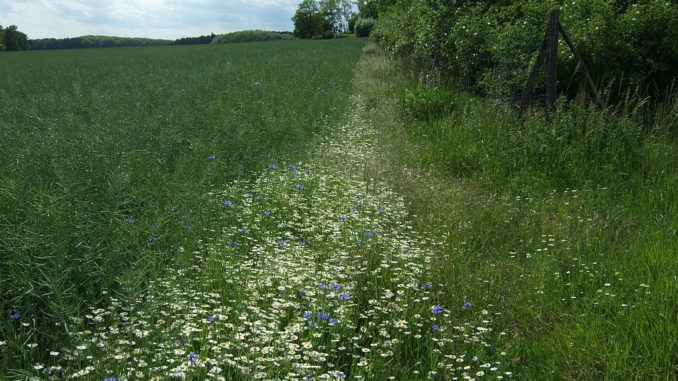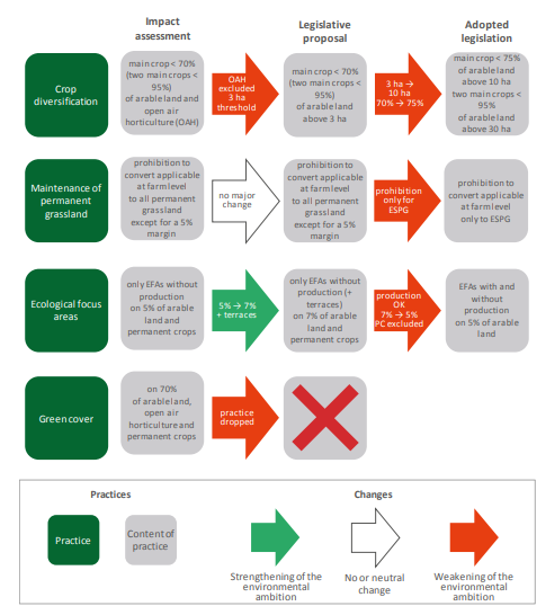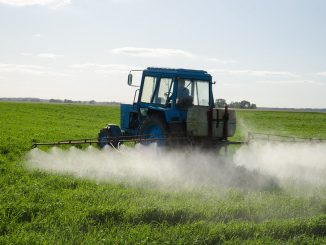
Greening measures are “unlikely to significantly enhance the CAP’s environmental and climate performance,” says Samo Jereb from the European Court of Auditors (ECA). The report, released in December, was also subject of a presentation by Jereb on 21st February at the European Parliament (see video below). As well as critique of the current greening measures, the ECA report provided a set of recommendations to improve the policy in the upcoming CAP reform. (report available to download in full here)
Green payments are a form of CAP direct payment which financially rewards farmers for taking care of the environment. Introduced by the 2013 CAP reform, they are the only direct payment with the sole objective of improving the CAP’s environmental performance. At €12 million a year, such payments make up 30% of all direct payments under CAP and almost 8% of the entire EU budget.
The audit examined greening measures in France, Greece, Poland, Spain and the Netherlands. It covered the overall design of the greening scheme, an assessment of the first two years of implementation and a measurement of the coherence between greening and other environmental measures within the CAP.
The report found that green payments had led to positive changes in farming practices on only 5% of EU farmland. Much of this was because 65% of the audited farmers did not have to change their farming practices in order to qualify for the green payments. This was because they had either already met the greening requirements or were exempt.
Currently, the greening payment outstrips the actual cost to farmers of implementing greening requirements. Consequently, “greening remains an income support scheme,” said Jereb, and European biodiversity and soil quality remain seriously and increasingly under threat. ARC has highlighted the failings of the greening payment, including in Germany and Ireland, patterns that can be seen across the continent.
Green payments reward farmers for adopting practices such crop diversification, the maintenance of permanent grassland and safeguarding of ecological focus areas (EFAs). The aim is to improve soil quality, encourage carbon sequestration and protect biodiversity. Yet the report found that it remained poorly defined how greening measures should contribute to EU soil, climate and biodiversity targets. Without such definition, the likelihood of reaching ambitious environmental targets remains slim.
As we have reported before, the designation of EFAs as part of the greening measures remains inadequate. Farmers need to relegate 5% of their land to EFAs, this includes using land for hedgerows, buffer strips and agroforestry but also for productive practices like nitrogen fixing and catch crops. EFA’s were watered down continuously during the previous CAP reform process, and, with the unexpected exception of the banning of pesticides in said EFAs, have continued this trajectory even into recent months.
These have significantly decreased environmental benefits, and, since Member States are able to choose those practices to encourage, these tend to be the most common. Jereb went on to say that Member States ‘did not use the flexibility in greening to maximise the policy’s environmental and climate benefits, rather they strived to implement greening in a way which minimised the burden on themselves and their farmers.’ Most Member States, it seems, chose the path of least resistance.
Without sufficiently ambitious environmental targets or a comprehensible intervention logic, greening measures added substantial complexity to the CAP, which is not justified by the likely outcomes of such a policy, the report argues.
In the run-up to the upcoming CAP reform, the report recommended that the Commission outline a complete intervention logic and specific set of targets of what greening measures should hope to achieve. It argues that farmers should only receive CAP payments if basic environmental measures are met, with tougher penalties for noncompliance. Rather than an income support scheme, the report says that funding must reflect the average costs incurred for a farmer to go beyond the environmental baseline. Finally, Member States should demonstrate how their chosen implementation plan would be effective in meeting policy objectives, prior to its application.
Analysis
Back in 2011, the Commission’s initial greening proposal was pushing for far more ambitious environmental outcomes, on the same budget. The proposal had stricter environmental requirements and fewer exemptions. A lengthy legislative process seriously diluted these objectives and little of that initial ambition remains. That is evident in the disappointing results reported by Jereb. See diagram below for more. Indeed, ARC2020 would argue – as indeed we have above- that even this one mildly positive trajectory, of EFAs, contained more negative steps than the report acknowledges.

Greening payments have proven to be empty contributions to an environmentally feeble CAP. It is futile to implement a set of conditions in an attempt to improve environmental performance, if the majority of farmers already comply with these conditions. It is unacceptable that the only environmentally-oriented direct payment should have positively changed farming practices on just 5% of EU land. Potential environmental improvements will always remain minimal.
CAP greening seems to be a justification strategy to maintain the productivist ethos of the CAP, allowing Member States to effectively opt out of meeting ambitious environmental targets whilst profiting from funds ear-marked for environmental improvement. It is positive to see an ECA report which details these failings in no unclear terms and will be interesting to see how these greening measures survive the next reform.
Presentation by Samo Jereb
(note presentation was on 21st February, not 23rd January as stated in the video description. See here)
#AfterCAP | Fit, Fair & Sustainable: A new agricultural policy model for the CAP 2021
Ecological Focus Area (EFA) in Germany: good for biodiversity & the tax payer?







1 Trackback / Pingback
Comments are closed.